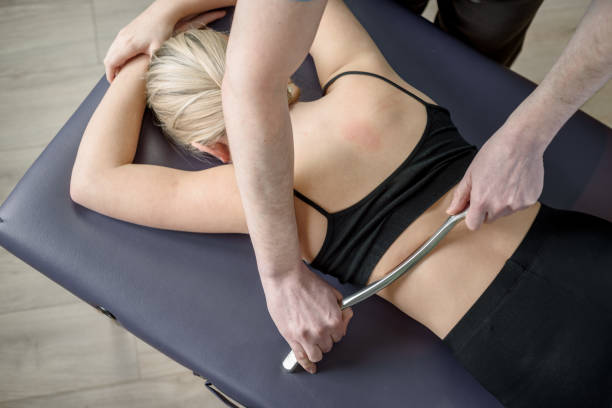How Often Can You Do IASTM? Advice From Physiotherapist

How Often Can You Do IASTM? A Newmarket Physiotherapy Guide
If you’ve been exploring treatment options for muscle tightness, scar tissue, or sports injuries in Newmarket, you’ve probably heard about IASTM (Instrument-Assisted Soft Tissue Mobilization). Those sleek metal tools your physiotherapist uses aren’t just for show—they can work wonders for breaking down adhesions and improving mobility. But here’s the question we hear all the time at PhysioChiroWellness: “How often can you actually do IASTM?” The answer isn’t one-size-fits-all. As your trusted clinic for physiotherapy in Newmarket, we’ll break down everything you need to know—from how IASTM works to the ideal treatment frequency based on your specific condition.
What Exactly Is IASTM?
Before we dive into frequency, let’s clarify what IASTM really does. Picture this: after an injury or repetitive strain, your soft tissues (muscles, tendons, ligaments) can develop micro-scarring or tightness that restricts movement. Regular massage helps, but sometimes, deeper work is needed.
That’s where IASTM comes in. Using specialized stainless steel or ergonomic tools, your physiotherapist in Newmarket applies controlled pressure to:
- Break up scar tissue
- Improve blood flow to injured areas
- Reduce muscle stiffness
- Restore normal tissue function
It’s like a deep-tissue massage, but more precise—and often more effective for stubborn issues like plantar fasciitis, rotator cuff injuries, or post-surgical adhesions.
How Often Should You Get IASTM? Key Factors to Consider
1. Acute vs. Chronic Injuries
If you just sprained your ankle last week (acute injury), you might benefit from 2-3 sessions per week initially to reduce swelling and promote healing. On the other hand, chronic issues (like years of shoulder stiffness) may need weekly sessions for 4-6 weeks, then tapering off as you improve.
2. Your Pain and Recovery Response
Some people feel instant relief after one session, while others need a few treatments to notice a difference. Your Newmarket physiotherapist will assess how your body responds and adjust frequency accordingly.
3. Activity Level and Goals
Are you a competitive athlete trying to return to play ASAP? Or someone managing arthritis discomfort? A runner with IT band tightness might need biweekly IASTM during heavy training, while a desk worker with neck tension could see results with monthly maintenance sessions.
4. Combining IASTM with Other Therapies
At PhysioChiroWellness, we often pair IASTM with:
- Chiropractic adjustments
- Therapeutic exercises
- Dry needling
This integrated approach can reduce how often you need IASTM alone by addressing the root cause.
What Research Says About IASTM Frequency
While studies on optimal IASTM frequency are still evolving, a Canadian Physiotherapy Association review notes that most protocols recommend:
- 2-3x/week for acute injuries (first 1-2 weeks)
- 1x/week for chronic conditions (3-6 weeks)
- Monthly for maintenance/prevention
Interestingly, overdoing it can backfire—aggressive daily scraping might irritate tissues rather than heal them. That’s why having an experienced physiotherapist in Newmarket guide your plan is crucial.
Real-Life Examples from Our Newmarket Clinic
Case 1: The Weekend Warrior with Tennis Elbow
John, a 40-year-old pickleball enthusiast, came in with forearm pain that hadn’t improved after months of rest. After assessing him, we did:
- IASTM 2x/week for 3 weeks (focusing on forearm extensors)
- Eccentric strengthening exercises
- Gradual return to play
By week 4, he was back on the court pain-free—now he comes monthly for tune-ups during peak season.
Case 2: The Post-Surgical Knee Patient
Sarah had knee replacement surgery but struggled with scar tissue limiting her mobility. We used:
- Weekly IASTM for 6 weeks to improve tissue glide
- Passive stretching
- Aqua therapy
Her range of motion improved by 30% after just 4 sessions.
FAQs About IASTM in Newmarket
Q: Does IASTM hurt?
A: It shouldn’t be excessively painful—think “good hurt” like a deep massage. Discomfort should subside within a day.
Q: Can I do IASTM on myself?
A: While DIY tools exist, improper technique can cause bruising or inflammation. Always consult a physiotherapy professional in Newmarket first.
Q: How long until I see results?
A: Many notice improved mobility immediately, but lasting change typically takes 3-5 sessions.
Q: Are there people who shouldn’t get IASTM?
A: Yes—avoid it if you have open wounds, blood clotting disorders, or severe osteoporosis unless cleared by your doctor.
Ready to Try IASTM in Newmarket? Here’s Your Next Step
If you’re dealing with persistent muscle tightness, injury recovery, or just want to optimize your movement, IASTM could be the solution. At PhysioChiroWellness, our certified practitioners tailor each session to your unique needs—no cookie-cutter approaches.
Take the first step toward better mobility:
📞 Call us at (905) 836-0571
📅 Book an appointment online by clicking here.
Don’t let scar tissue or stiffness hold you back—let’s get you moving freely again.
